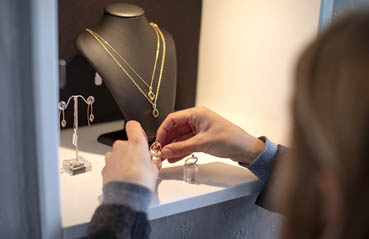Published: 20 Aug 2018
Why must you take an invoice when you buy gold?

You might have heard of certain gold retailers offering discounts in lieu of an invoice or jewellers handing a temporary bill on a plain paper.
What would you do if you find yourself in the same situation the next time you set out to purchase gold jewellery? Would you insist on making your purchase only from a jeweller that provides a permanent bill, or would you settle for either no bill or a temporary one?
There are many reasons you must insist on a permanent invoice when you buy gold.
But before that, let’s understand the difference between a temporary and permanent bill:
Temporary vs permanent bill
Temporary bill is the one issued by a trader to a customer on purchase of an item that doesn’t reflect in the books of account of the trader. Thus, he can avoid paying income tax, and the customer avoids paying various taxes (now GST). A temporary bill merely provides name of the jewellery store (from which the jewellery piece has been bought) and the jewellery item bought by you. It is often created on a blank piece of paper or called an estimate. It’s transactions like these that generate black money.
On the other hand, a permanent bill or an invoice is based on a legitimate transaction and provides many details including the following:
- Purity of the gold bought
- Jewellery name and code
- Break-up of the exact amount of gold you are paying for and additional charges such as making and wastage charges.
- GST Identification Number of the jeweller
Related:Simplifying gold purchases: A look into making and wastage charges
So, why is it so important to get a permanent bill that properly documents your transaction?
- Proof of purity
A permanent bill is an official record of your gold purchase. It provides assurance of purity It will assist you on any taxation related inquiries.
- Proof of legality
Purchasing gold jewellery without a proper bill also promotes illegal trade activities. An invoice declares that you are purchasing the particular gold ornament of the mentioned purity at the stated price from the seller who issues the invoice, thus confirming a legal transaction between you two.
- Proper value for purchases
Most jewellery stores clearly state their buy back policies or terms and conditions. They may be unwilling to modify or exchange your gold jewellery if you don’t have a proper invoice. A proper invoice also details the making charges, rate of gold and GST that the buyer pays. In absence of these details, you may be overcharged for your purchases.
Related:Have gold jewellery you don’t wear anymore? Here are 5 things you can do
- Proof of legal ownership
In December 2016, the Government of India imposed a penalty for the discovery of undisclosed wealth by Income Tax authorities during seizure and search. This means that while there is no limit on holding inherited jewellery that can be accounted for, you would be penalised if you are found holding gold beyond the allowed limit that you cannot account for. An invoice is one of the ways to prove that you are the legal owner of your gold so that you and your gold don’t come under the scanner. If you fail to produce proof, a penalty of up to 60% of the gold you own beyond the permissible limit will apply, with an extra 25% surcharge.
Related:7 Ways to prove legality of your gold- and what happens if you don't
As a gold buyer, the onus lies on you to insist on a bill when you buy gold. This invoice ensures that both you and your most cherished gold jewellery are always protected so you can reap the many economic, social and cultural benefits of possessing this most precious metal.











